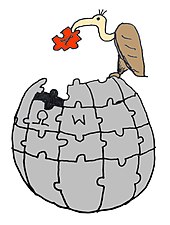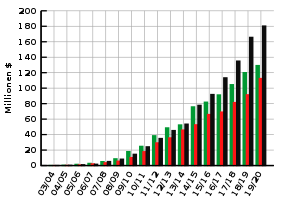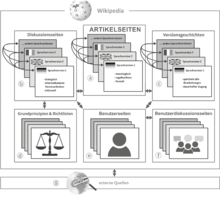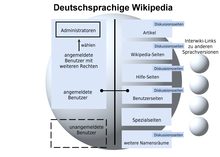Wikipedia
![]()
This article is about the online encyclopedia. For the German-language edition, see German Wikipedia; for the asteroid, see (274301) Wikipedia.
Wikipedia [ˌvɪkiˈpeːdia] ( ![]() ) is a non-profit project founded on 15 January 2001 to create a free Internet encyclopedia in numerous languages using the so-called wiki principle. According to audience demand and distribution, Wikipedia meanwhile belongs to the mass media.
) is a non-profit project founded on 15 January 2001 to create a free Internet encyclopedia in numerous languages using the so-called wiki principle. According to audience demand and distribution, Wikipedia meanwhile belongs to the mass media.
The Wikipedia offers free, i.e. free of charge and intended for further dissemination, articles to be found under lexical entries (lemmas) as well as portals according to subject areas. According to co-founder Jimmy Wales, the goal is "to create a freely licensed and high-quality encyclopedia and thus to disseminate lexical knowledge".
In January 2021, Wikipedia was the thirteenth most visited website in the world. In Germany it ranked seventh, in Austria sixth, in Switzerland fourth and in the USA eighth. As in the German-speaking countries, the website is the only non-commercial website in the top 50 worldwide. It is financed by donations.
As of 31 December 2020, more than 55.6 million Wikipedia articles have been multi-authored in nearly 300 languages. In addition, the articles are continuously edited and discussed according to the principle of collaborative writing. The mentoring program offers new contributors free entry-level volunteers to choose from. Almost all Wikipedia content is available under free licenses.
Wikipedia is run by the Wikimedia Foundation (WMF), a non-profit organization based in San Francisco (USA). In many countries around the world, there are also independent Wikimedia associations that cooperate with the Foundation but do not operate Wikipedia; in the German-speaking world, these are Wikimedia Deutschland (WMDE), founded in 2004, Wikimedia CH (WMCH) in Switzerland since 2006, and Wikimedia Österreich (WMAT), founded two years later.
Name and logo
Name
The name Wikipedia is a nested word made up of "Wiki" and "Encyclopedia" (the English word for encyclopedia). The term "wiki" comes from the Hawaiian word for 'fast'. Wikis are hypertext systems for web pages whose content can not only be read by users, but also modified online in a web browser. The articles are linked to each other like a net.
Logo
The Wikipedialogo consists of a sphere made up of puzzle pieces and is not completed because several pieces are missing from the top end. The individual puzzle pieces bear the inscription of glyphs from different writing systems. Underneath the sphere, the word mark of the respective language version is displayed on the web pages.
· 
The development of the Wikipedia logo
· 
German Wikipedia logo (2003 to 2010)
· 
German Wikipedia logo (since June 2010)
The graphic content is also created by "Wikipedians". The first logo for Nupedia was created by Bjørn Smestad, the second by The Cunctator, and the third by Paul Staksiger. This one was last modified by Notah in 2010. The logo, designed by Bjørn Smestad, features a fisheye projection of an excerpt from the preface of Lewis Carroll's book Euclid and his Modern Rivals. The logo designed by The Cunctator used a text from Leviathan by Thomas Hobbes. This was followed by a representation of an unfinished puzzle in the shape of a globe, with each puzzle piece containing a different glyph (letter or character) as an inscription, symbolically representing the multilingual nature of Wikipedia. Between 2003 and 2010, the logo contained the Klingon character for the letter r in the upper right position. The words "Wikipedia - The free encyclopedia", formerly set in the Hoefler Text font, have been used in the Wikipedia logo in all language editions of Wikipedia since 2010, and are set using Linux Libertine. In countries using the Arabic alphabet, a specially designed crossed ![]() (which was originally composed of two "V "s) has since been included in the font as an OpenType feature. The WikipediA script is written in small caps with a capital A at the end.
(which was originally composed of two "V "s) has since been included in the font as an OpenType feature. The WikipediA script is written in small caps with a capital A at the end.
How it works
Principles
According to the project, four principles are irrevocable and cannot be changed even after discussions:
- Wikipedia is an encyclopedia.
- Contributions shall be written in such a way as to comply with the principle of a neutral point of view.
- Content is free, it must be under a free license.
- Other users are to be respected and the wikiquette is to be observed (a derivation from the nested word netiquette, which in turn derives from the English 'net' and the French 'étiquette' for rules of etiquette).
As a rule of conduct, the Wikiquette requires contributors to respect their fellow authors and not to insult or personally attack anyone in discussions. The basis for this is the rule "Assume good intentions!". The principles of neutral point of view, verifiability, and no theorizing (by which is meant original research) are intended to guide the content of articles. To de-escalate or settle inevitable disagreements and arguments over article content, and to allow readers to form their own opinions and support their intellectual independence, Wikipedia has established the policy of neutral point of view (NPOV). If different views exist on a topic, an article should describe them fairly, but not take a position itself. However, the neutral point of view does not require that all views be presented equally (see also prevailing opinion). Social processes should ensure that it is adhered to, which often leads to lengthy discussions on controversial topics.
According to theory, the editors decide in an open process which topics are to be included in the encyclopedia and in what form. Conflicts usually arise in this context over what constitutes "knowledge", where the demarcation from pure data lies, and what is to be understood by encyclopaedic relevance. Apart from rough guidelines that distinguish Wikipedia from other types of works such as dictionaries, databases, link or citation collections, there are no general catalogues of criteria (e.g. for biographies) as are common in traditional encyclopaedias. In case of doubt, the discussion is on a case-by-case basis. If a user feels that a topic is unsuitable or an article is not appropriate to the topic, he or she can submit a deletion request, which is then discussed by all interested parties.
By saving their edit, authors give their consent for their contribution to be published under the GNU Free Documentation License (GFDL) and, since 15 June 2009, also under the Creative Commons Attribution-Share Alike License (CC-BY-SA). These licenses allow others to modify and distribute the content as they wish - even commercially - as long as the terms of the licenses are adhered to and the content is republished under the same licenses. This copyleft principle makes it impossible to exclusively exploit Wikipedia articles and texts based on them by invoking copyright.
Although the authors mainly work under pseudonyms, their authorship is also protected within Wikipedia. For example, when merging or translating articles or parts of articles, the associated version history must be transferred, which makes it possible to trace which author made which contribution.
Structure
Wikipedia consists of many language versions, each of which has its own subdomain (e.g. de.wikipedia.org, en.wikipedia.org) and is technically a separate wiki. The language versions are largely self-sufficient in terms of their content, guidelines, and organization. Encyclopedic articles are created individually in each language version. Articles on the same subject in different languages can be linked together. However, they are not usually translated from each other or synchronized in content.
The web pages of each wiki are divided into groups called "namespaces". The most important namespace is the article namespace (ANR) with the encyclopedic articles. In addition, there are other namespaces, for example the Wikipedia namespace with pages about Wikipedia metadiscourses, including the guidelines. The help namespace groups together help pages that contain instructions on the methodical implementation of article edits. Registered users each have user pages in the user namespace, which they can freely fill with content and design, whereby a reference to Wikipedia should exist. Frequent entries there concern personal information about age, origin and profession, user-specific technical assistance, editing priorities, naming of articles opened by the user as well as criticism of Wikipedia.
In all namespaces, each page has an associated discussion page. In principle, discussion pages can be edited in the same way as normal pages. However, there are certain conventions of their own here, such as the signing and indenting of discussion posts, in order to make the course of the discussion recognizable.
The content of all pages is organized as hypertext. Cross-references and formatting instructions are entered by the authors in a simple syntax. For example, the software automatically converts terms placed in double square brackets ([[...]]) into an internal link to the article in question. If the linked article already exists, the link is displayed in blue. If the article does not yet exist, the link appears in red, and clicking on it opens an input field in which the user can write the new article. This simple linking option has ensured that Wikipedia's articles are much more closely interlinked than those of other encyclopedias on CD-ROM or the Internet.
In addition to the hyperlinks to other articles in the context, there are other navigation options such as categories (at the bottom of each page), info boxes, navigation bars or the alphabetical index, which, however, play a subordinate role.
Tasks of the authors
Wikipedia authors choose their own fields of activity. The core is the actual writing of articles. In addition, users are involved in proofreading and improving, formatting and classifying, or illustrating the articles. Other users write or improve help pages, supervise new Wikipedians in the mentoring program and answer questions in the support team. Administrators, who are elected by a two-thirds majority of the community, promote the enforcement of "law and order", for example by blocking "vandals", users who falsify articles, delete them, work in an unencyclopedic manner or insult other users. Wikipedians with programming skills create utilities to support work on Wikipedia.
Organisational structure
The operator of Wikipedia is the Wikimedia Foundation, based in San Francisco. The individual language versions of Wikipedia are structured according to the same basic concept, but enjoy great independence.
The organizational structure is mainly determined by norms created in informal organizational processes. Users can acquire a reputation with their contributions in the community. In addition to the persuasiveness of arguments, social status within the Wikipedia community - acquired, for example, through expertise in certain fields, but also by establishing contacts and forming informal cliques - plays a role in the acceptance of edits in the article namespace.
Registered users who have already made a certain number of edits have additional rights. Particularly dedicated participants can be elected administrators by the author community. Administrators have extended rights and tasks, such as the right to block the editing of controversial articles for non-registered users or to temporarily exclude editors who grossly or repeatedly violate the rules.
Most Wikipedia rules are created by many participants taking up and applying a single proposal. If such a proposal is supported by a qualified majority of users, it is considered accepted and can become the rule.
In the case of controversial decisions, Wikipedia traditionally tries to reach a consensus. In practice, however, true consensus is often not possible among the large number of contributors. In such cases, decisions are made in procedures that fall somewhere between discussion and voting.
The greatest personal influence - especially in the English-language Wikipedia - has the founder Jimmy Wales, who arbitrated conflicts in the community at the beginning. At the beginning of 2004, he transferred some of his tasks in the English-language Wikipedia to an "arbitration committee" elected by the participants. This institution, which is comparable to a court of arbitration, also exists in other language versions, including the German- and French-language Wikipedia, although the respective powers differ significantly.
Over time, opposing beliefs have emerged about how Wikipedia should evolve. One major difference of opinion is between the "inclusionists" and the "exclusionists". Here, the inclusionists advocate including as much information as possible in Wikipedia and deleting as few articles as possible. One project that emerged from this dispute in the English-speaking world was the Deletionpedia. The opposite position is taken by the exclusionists, who warn against including information that is too detailed and irrelevant.
Funding
![]()
This article or section needs revision. More details should be given on the discussion page. Please help improve it, and then remove this tag.
Wikipedia is funded exclusively by donations from private individuals and companies, with fundraising campaigns only running until the specified donation amount is reached. The Wikimedia Foundation's expenses amounted to $81.4 million in the 2017/2018 fiscal year. Of that, about 47 percent went to salaries for its more than 350 employees and about $2.3 million went to internet hosting. The budget for the 2018/2019 fiscal year was just under $93 million. With a donation of two million dollars in 2010, the Internet company Google Inc. is one of the largest single donors.
The individual national Wikimedia chapters also contribute to the funding of Wikipedia. For example, Wikimedia Germany has about 100 employees in 2019 and operated the tool server, which provided tools for Wikipedia authors, but now only the map server OpenStreetMap.
In 2018, donations totaled $97.7 million, and in Germany the proceeds amounted to €8.9 million. It has been criticized that the appeals for donations always have higher sums as a goal, although the Wikimedia Foundation had assets of 78 million dollars in 2015.
Technology
Initially, Wikipedia used the UseModWiki software, written in Perl, but this was soon no longer able to meet the requirements. In January 2002, Wikipedia switched to a MySQL-based PHP application (Phase II) written by German biologist Magnus Manske, which was specifically adapted to Wikipedia's needs. After sharing resources with Bomis' website for over a year, the English-language Wikipedia, and later the other language versions, moved to its own server in July 2002 with a version of Manske's software (Phase III) revised and partially rewritten by Lee Daniel Crocker. This was later named MediaWiki.
Wikipedia runs on Linux servers, mostly the server variant of Ubuntu, and with some OpenSolaris servers for ZFS. HTTP requests first go to Varnish caches, which serve pre-generated pages to unlogged-in visitors who just want to read. The other requests go to load-balanced servers based on Linux Virtual Server software, from where they go to one of the Apache HTTP servers. This server uses the PHP scripting language and the MariaDB database to generate the pages user-specifically. The MariaDB database runs on several servers with replication in master-slave mode.
As the number of users increased, so did the hardware requirements. Whereas in December 2003 there were only three servers, in September 2014 there are now 480 servers in use in Tampa, Amsterdam and Ashburn for the operation of Wikipedia and its sister ventures, which are looked after by a team of both volunteer and salaried administrators. The principle of naming servers after famous encyclopedists was abandoned in 2005.
Wikipedia servers process between 25,000 and 60,000 hits per second, depending on the time of day.
Several companies and organizations offered their support to the Wikimedia Foundation in the past.
The development of the software, for example the installation of new functions, is determined by the team of programmers, who are independent of the community. On the one hand they try to orientate themselves on the wishes of the users, on the other hand they implement new ideas, such as extensions, from outside.
Main page
Each language version of Wikipedia has its own main page, which is designed individually. In most language versions, Wikipedia is briefly introduced at the beginning of the main page, the current number of articles is given and, in some places, references are made to further links, such as portal pages. This is followed by sections where Wikipedia articles are presented in different ways. Most language versions have an Article of the Day section, which outlines a special, excellent article, an In the News section, which refers to articles based on the day's events, a What happened on...? section, which refers to historical events, and a news section. which refers to historical events, and a "Did you know? in which newly created articles are presented. Some of the articles refer to the picture of the day from Wikimedia Commons, to other Wikiprojects or to other selected language versions.
Evaluation of articles, incentives
The Wikipedia community provides various incentives for authors to write articles and to write good articles. For example, there is the article marathon, the monument cup or the writing competition. If an article is comprehensive, technically correct, validly documented, generally understandable and descriptive, it can also apply for a predicate award and is evaluated by the community within a certain time. If the candidacy is successful, the article can receive the award worth reading. If it even has outstanding quality, it can be awarded as excellent. In addition, good lists and portals can receive the rating informative. Such excellent articles should serve other authors as a model for the creation of high quality articles. They are also usually featured on the main page of Wikipedia. Another contest offered on a calendar yearly basis is the WikiCup, in which article writers and photographers can collect points. Each quarter, the top scorers are determined, who then advance to the next round until a points winner is determined at the end of the year.
Bots
Some language versions of Wikipedia use bots, computer programs or scripts that perform regular or repetitive tasks that can be automated (such as correcting typos). They are also occasionally used to automatically create articles. This is often criticised and rejected by some language versions because it results in masses of very short articles; this can be seen, for example, in the Volapük Wikipedia or the Dutch-language Wikipedia.
Categorization of articles
Categories are a means in Wikipedia of classifying pages according to certain characteristics. A page can be assigned to one or more categories; the categories can in turn be assigned to other categories. They are always displayed at the end of a page. This creates a content-based system and articles can be assigned to different subject areas. They thus form the basis for statistical evaluations of the composition of the articles. The root of the category system of Wikipedia is the !main category.
Relevance criteria and deletion discussions
The decision for or against inclusion in an encyclopaedia is also based on whether persons, events or topics with a currently broad public impact are also likely to be of importance in the long term. Continued public reception can also be an indication of relevance. So that as few cases of doubt as possible arise, the relevance criteria have emerged from the consensus of several years.
If an article does not meet the relevance criteria, it can be deleted; this also applies to poor quality, vandalism, copyright infringement, etc. There are two options for deletion: In obvious cases or in the case of previously deleted articles, there is a quick deletion request, the article is then usually deleted within a few minutes by an administrator. Mostly, however, there is a deletion discussion for at least 7 days whether an article complies with the rules and whether it should be deleted.
Martin Haase, a linguist, member of the Pirate Party and the Chaos Computer Club, and former board member of Wikimedia Deutschland, emphasized in 2011 that there are differences between the German-language Wikipedia "and all the rest" with regard to the question of how free knowledge should be collected - rather broadly or rather deeply. In the German-language Wikipedia, "certain relevance criteria [of the printed encyclopaedias] have been adopted without reflection", "which today [...] is almost impossible to break down".

Caricature of a "fire vulture"

Wikimedia server in Florida, USA
.svg.png)
Diagram of the Wikimedia server architecture

Logo of MediaWiki (since 2021)

Income and expenditure of the Wikimedia Foundation between 2003/04 and 2018/19 (green: income, red: expenditure, black: equity)

Logo of the Wikimedia Foundation

Schematic representation of the Wikipedia structure

People and pages in the German Wikipedia
.png)
Main page of the German-language Wikipedia as of 13 November 2013
Questions and Answers
Q: What is Wikipedia?
A: Wikipedia is a free online encyclopedia website in 327 languages of the world, 316 of which are currently active. It is an open content website, meaning anyone can copy it and make changes to it if they follow the rules for copying or editing.
Q: Who owns Wikipedia?
A: Wikipedia is owned by an American organization called the Wikimedia Foundation, which is located in San Francisco, California.
Q: How many languages does Wikipedia have?
A: As of September 2011, Wikipedia had about 18 million pages in about 300 languages and more than 3.50 billion words across all Wikipedias. The regular English Wikipedia is the largest edition.
Q: When was Wikipedia started?
A:Wikipedia was started on January 10, 2001 by Jimmy Wales and Larry Sanger as part of an earlier online encyclopedia named Nupedia. On January 15th 2001, it became a separate website of its own.
Q: What software does Wikipedia use?
A:Wikipedia uses the software MediaWiki (like all other Wikimedia Foundation projects).
Q: Is there a standard page layout for all pages on Wikipedia?
A: Yes, there is a standard page layout for all pages in the encyclopedia on Wikipedia.
Search within the encyclopedia